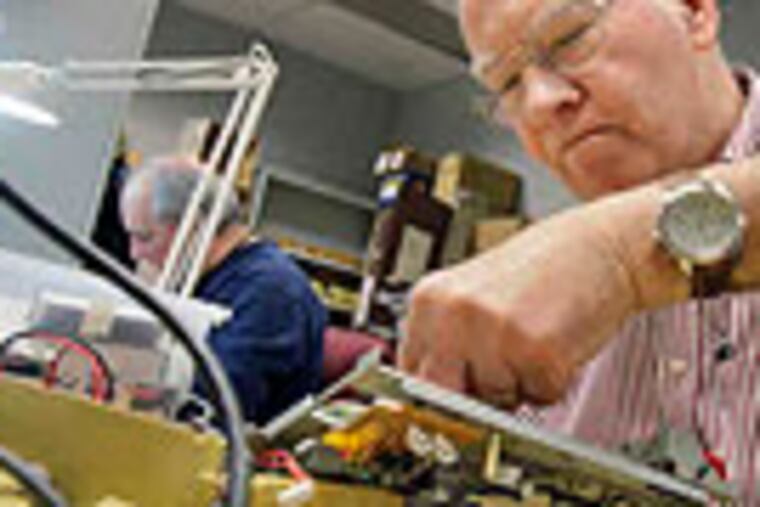The men who keep the 'talking books' talking
Christian D. Charron retired from General Electric in 1995 as chief engineer and technical director of a classified program. His work required him to master a variety of intense jobs, including fixing orbiting satellites.

Christian D. Charron retired from General Electric in 1995 as chief engineer and technical director of a classified program. His work required him to master a variety of intense jobs, including fixing orbiting satellites.
All the more ironic to see him flummoxed one morning last week - by a tape player.
"It works, and then it stops," said an exasperated Charron, the machine laid open before him, its amplifier board and other guts exposed.
Why? "I don't have any idea."
That he and six other GE retirees were spending a morning not lazing at home but laboring with soldering irons and long-nosed pliers was entirely their choice.
Charron and company spend two mornings a week in a 754-square-foot glorified storage room in a Montgomery County office building, repairing "talking book" tape players.
In all, Charron leads a legion of 27 fixers - men (though women are welcome) ranging in age from 66 to 92, and with a variety of aches and pains - who are part of a national network of 1,000 volunteers who breathe new life into about 100,000 players a year, said Kevin Watson, equipment-repair officer for the Library of Congress' National Library Service for the Blind and Physically Handicapped.
The machines are provided for use at no cost. On average, a typical malfunctioning tape player requires about $20 worth of parts - a quarter of the cost if the repairs were done by a private contractor, Watson said.
"That's huge savings," he said, adding that "Congress is never all that thrilled about giving us more money."
The repair volunteers are "the backbone" of the lending program, whose first known volunteer, Watson said, was James Jones, a telephone-company employee in Arkansas who offered his services in 1950.
Back then, the Library Service was providing record players. Cassette players followed in 1971, Watson said. About a year ago, digital devices entered the mix.
But for now, it's the tape players that keep Charron and his retired GE compadres busy Tuesday and Thursday mornings in a closet-turned-workshop.
The room, with just two narrow windows, is easily overlooked inside 500 Virginia Dr., a cavernous building in the Fort Washington Office Park where General Electric still has offices, though it sold the property in May 2007 to a New York-based partnership.
The local "talking book" repair chapter was created in 1989. Many of the workbenches and repair tools have come from shuttered GE facilities throughout the region, said David Blake, 82, of Broomall, as he glued a part onto a cassette machine.
A 40-year GE employee, Blake retired in 1991 as manager of an aircraft-engine sales office in Center City.
"Until I had a leg problem, I used to play golf three times a week," he said of his initial years of retirement.
Now, Blake spends Tuesday and Thursday mornings putting his analytical and tinkering skills to work. It's not for a paycheck, just for the satisfaction of helping people he likely will never know listen to books.
Last week, most of the nearly three dozen tape players stacked on shelves in the repair room had been sent from a library in Michigan. Others routinely come from Puerto Rico, Alaska and the Virgin Islands.
And sometimes, they come with passengers.
"I had one machine completely encased in roach bodies," said Neal Shepard, 72, who until his retirement in 1999 was an aerospace-system engineer for GE in King of Prussia and its successor, Lockheed Martin.
He downplayed the difficulty of his volunteer work, saying, as he replaced a shot reel head, only that it "requires certain eye-hand coordination skills."
What is not insignificant is the sense of usefulness the work affords those no longer working, said Homer Needle, 83, of Bryn Athyn, a draftsman and engineering designer at GE for 39 years before retiring in 1990.
"I feel at least I'm not wasting my time" in retirement, Needle said, as he nimbly plucked screws from a tape player he was taking apart. "I'm doing some good."
On this particular day, Peter Nastasiak, 67, was the youngster in the room. The former aerospace-systems engineer, retired since 2001, decided six years later to spend some of his freedom solving the ills of "talking book" players because his neighbor in Radnor "pestered the living daylights out of me."
That would be Mathew Dellarco, who worked for GE 35 years in a variety of jobs, including product manager for a breeder-reactor project whose cancellation still steams him more than three decades later. He has been retired since 1992, and repairing tape players ever since.
"I enjoy the fellowship," said Dellarco, 77, gesturing to a board nearby with pictures of each of the 27 volunteers. "We used to have another board of the guys that died, but that became too depressing. So that's gone."
His plan is to keep showing up every week "til I can't anymore. And right now, that seems like a long time away, but we'll see."
Meanwhile, Charron had a win streak on the line - an ability to fix anything. It's a knack that irritates his wife, Verna. She has wanted to buy a new dryer, he says, but he keeps reviving the one they've had for 37 years.
So the 76-year-old Newtown Square resident returned to Virginia Drive Thursday morning determined to crack the mystery of the malfunctioning cassette player. It didn't take long.
"I figured it out about 10 minutes after I got here," Charron said. The culprit was a bad motor.
"I put a spare one on," he said. "It works great."